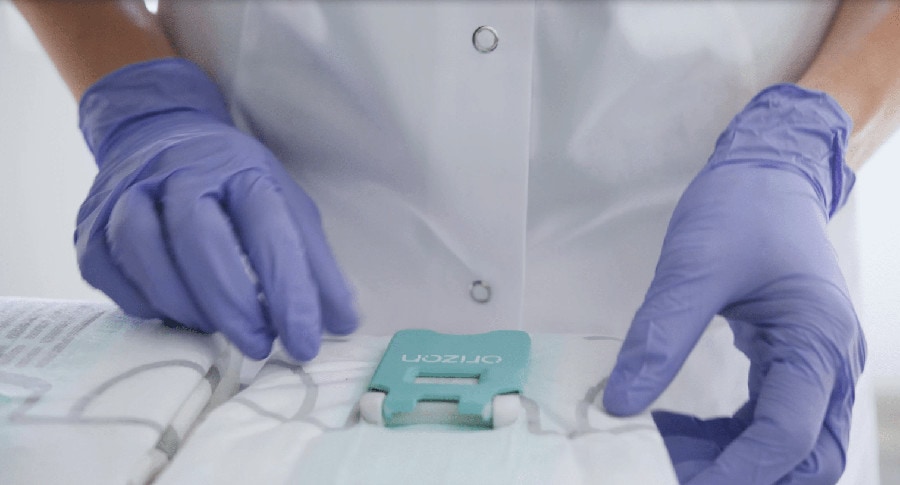Electronic device for better continence care halves pad usage, finds trial

An innovative continence care device has been found to improve residents’ comfort and sleep quality, lessen the time burden on staff for unnecessary bed and clothing changes, and reduce spend on protection products.
The findings are derived from seven studies that have been conducted between 2022 and 2023 in centres in the UK, France, Germany, Italy, and Belgium. They tested the Orizon SMART continence care solution from personal hygiene group Ontex.
The Orizon SMART features a rechargeable transmitter clip that senses moisture and notifies caregivers when residents require changing. It links to a user-friendly app and presents a traffic light system to help caregivers make continence checks only when necessary.
Product testing took place over four weeks and in total involved almost 100 residents and over 120 care professionals across the seven locations.
Results of implementing the digital incontinence care assistive technology included staff time gains from 28 minutes per shift per caregiver to 3.2 hours and reduced spend on incontinence products of between 21 percent and 25 percent (excluding cost efficiencies from reduced laundry).
The studies also pointed towards an improvement in resident comfort and dignity, reported by 80 percent of caregivers, and a reduction in physical burden placed on staff, reported by 100 percent of staff in France study.
Avoiding leakages is among benefits of the solution, with the Germany trial reporting zero bed linen changing due to leakage. In that study, 100 percent of staff said they would recommend the device.
A key learning from the research is the need to “revolutionise” incontinence care culture, transitioning from the current standard – routine 24 hour per day changing of pads – towards personalised care that puts residents’ dignity at its heart, Ontex says.
Helen Seymour, UK and Ireland Commercial Director for Ontex UK, commented: “Our objective in these trials is to evaluate the efficiency of Orizon SMART in both cost and time savings for caregivers and whether it facilitates their workload, while improving patient quality of life.
“What we found was an overwhelming endorsement of the technology. In fact, in the France study, more than 80 percent of caregivers corroborated an improvement in residents’ comfort and dignity.
“Routine continence checks do not represent the actual voiding behaviours of residents. We now know what good continence care looks like, and with emerging technology, we can deliver it. Our Italy research showed that the number of wet beds managed by the team dropped from eight to 10 each week to just one.”
The research also encompassed an acute hospital setting in Wales, at the NHS Ysbyty Cwm Cynon Hospital (YCCH), with patients on a long-stay ward that mostly cares for older individuals with dementia.
Whereas pre-trial, the majority of nurses would change incontinence products every four hours, 87.5 percent began changing products based on need, rather than routine. This resulted in reduction in average pad usage from six per 24 hours to just 3.2.
It was estimated that each nurse saw a reduction in workload for a minimum of 28 minutes per shift from reduced pad changes. In addition, while 1,000 products were used during the study, only two leakages were observed due to the product not being changed in time after being alerted.
Helen added: “Anecdotally, the staff in our Wales trial reported that this allowed them to spend more time on individual care with patients. And we have calculated that if this particular ward rolled out the solution for one full year, it would save 1,700 hours from unnecessary pad changes, and reduce pad use by over 10,000.
“Interestingly, in our international studies we observed benefits that went beyond the core scope of the research. For example, demonstrating the potential for residents to enjoy better sleep quality, due to less disturbances, with a knock-on positive impact to resident behaviour. Plus, use of Orizon SMART boosts sustainability due to less processing of laundry. It’s a win for the planet as well as each person.
“Although we have focused on an older demographic, we believe this is just the start for the application for Orizon SMART. It could help across settings, for example, for the care of young adults where potentially palliative care or physical needs are present.”

